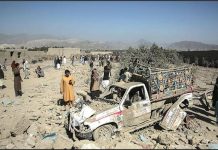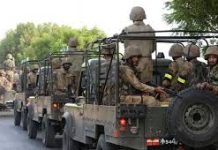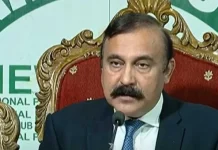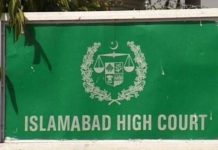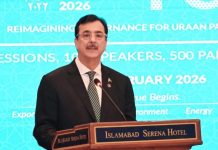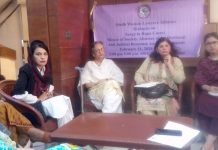Geneva:The World Sindhi Congress (WSC) organised a large protest in front of the United Nations Human Rights Council (UNHRC) in Geneva during its 58th Session to raise awareness about the environmental destruction caused by the construction of canals on the River Indus and the ongoing human rights violations in Sindh. The protest was attended by Sindhi representatives, exiled leaders from Balochistan and Khyber Pakhtunkhwa, as well as human rights defenders from Bangladesh and various European countries.

Prominent speakers at the protest included Mr. Zamader Nazul Islam, Arif Ajakia, Dr. Hadayat Bhutto, Hafeezan Wadhio, Abdul Rauf Leghari, and Mohammad Idrees Jamali. They highlighted Pakistan’s systematic oppression of Sindhi, Baloch, and Pashtun communities and condemned the state’s policies that have led to severe human rights violations.

Speakers emphasized the emerging humanitarian catastrophe caused by the construction of six new canals on the River Indus. They warned that Sindh is already suffering from severe drought, destruction of agricultural lands, and the collapse of its delta due to water theft by Punjab. These new canals, they stated, would exacerbate the crisis, displacing millions, destroying ecosystems, and devastating Sindh’s environment. Additionally, concerns were raised over the large-scale allotment of agricultural land to the Pakistan Army under the guise of corporate farming, which threatens Sindh’s rural communities.

The protest also drew attention to the alarming increase in enforced disappearances and extrajudicial killings of Sindhi political activists, as well as the systematic persecution and displacement of Sindhi Hindus. Speakers condemned these atrocities, calling them acts of ethnic cleansing and urging immediate action from the international community.
The protesters put forward the following demands:
– Immediate halt to the construction of new canals on the River Indus and adherence to international laws on equitable water distribution.
– A complete ban on the allotment of agricultural lands to the Pakistan Army to prevent further displacement of Sindhi communities.
– An end to enforced disappearances, extrajudicial killings, and persecution of religious minorities, with perpetrators held accountable under international law.

Speakers expressed their deep concerns over the impunity with which these human rights violations are carried out, leaving victims and their families with no path to justice. In light of these grave violations, the WSC called upon the United Nations and the international community to urgently intervene by establishing a Fact-Finding Mission to investigate these crimes and take immediate and effective measures to protect the Sindhi people from further suffering.
The WSC remains committed to advocating for the rights of Sindhi people and will continue its efforts to bring global attention to the ongoing injustices in Sindh.

